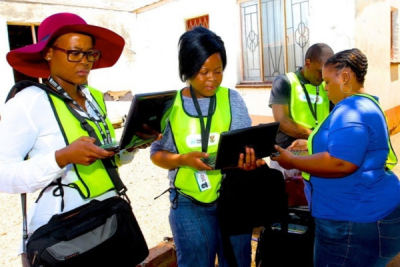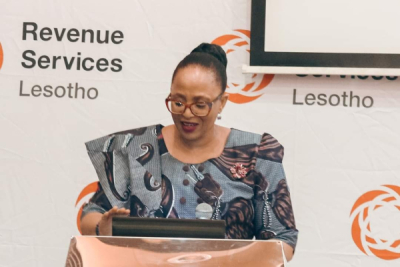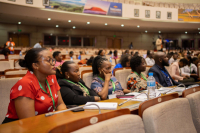
Public Management (483)
Kenya, which is at the forefront of Africa's young technology scene, is increasingly attracting international companies looking to tap into the potential of its burgeoning IT sector. In that context, authorities are developing resources to facilitate the liaison between the various parties.
Last Friday, the Kenya National Innovation Agency (KeNIA) officially launched the Kenya Innovation Bridge, a digital marketplace to connect innovators, inventors, researchers, and start-ups with funders, customers, and users, in Mombasa.
This marketplace aims to enable as many innovations as possible to scale up by attracting appropriate funding and partnerships.
According to George Masila (photo, left), KeNIA's head of communications and partnerships, the marketplace was set up because there was a gap between innovators and people interested in their innovations.
“What we did is we developed a platform that would enable them to have that direct connection with those people who will be interested in whatever they are doing. [...] The innovation platform is just a simple interface that people of all levels of education can easily interact with. It’s almost like a LinkedIn or Facebook version,” he said.
Recently dubbed the "Silicon Savannah" because of its thriving technology ecosystem, Kenya is one of the fastest-growing economies in sub-Saharan Africa. According to the Swiss Business Hub Southern Africa, this technology ecosystem is estimated to be worth $1 billion and is an attractive environment for businesses, investors, and high-tech professionals. It is already host to subsidiaries of leading companies such as Facebook, Microsoft, IBM, and Intel.
With the launch of the Kenya Innovation Bridge, the Kenyan executive wants to further foster innovation in the country. The platform will link to investment/partnership and capacity-building opportunities that will turn innovations into commercially viable products and businesses, thereby contributing to job creation and overall economic growth in the country.
Samira Njoya
The rapidly changing world is powered by emerging technologies such as AI, 5G connectivity, and the cloud. It is, therefore, crucial to build public authorities' capacities in those technologies to enable them to participate in the ongoing digital transformation.
Last Friday, the Commonwealth Secretariat and U.S. tech company Intel launched a digital learning platform to enable public servants from the 56 Commonwealth member countries- including 21 African countries- to understand and harness emerging technologies like artificial intelligence.
The program, titled "Digital Readiness for Public Sector Leaders," aims to demystify AI for senior Commonwealth officials and raise awareness of its potential applications in various sectors, reports the release issued by the organization.
Unveiling the platform at the Commonwealth's headquarters in London, Commonwealth Secretary-General Rt. Hon. Patricia Scotland (photo) said, "this course is a new and important milestone achievement, which the Commonwealth has developed for our member countries in close collaboration with Intel. It provides a unique opportunity for public sector workers and leaders in member states to be trained in the fundamentals of Artificial Intelligence and Machine Learning."
Recent developments have forced governments to drive national digital transformation to improve services to citizens and maintain competitiveness by appropriately designing and using technology solutions. However, any digital transformation requires leadership training, and according to Gartner's "Transition to Digital Government in 2022," 80 percent of public sector leaders say they are lagging behind the private sector.
As such, the new program will enable governments to develop strategies, scalable solutions, and action plans for digital transformation in their communities. It covers topics such as digital governance, technology, infrastructure, and inclusion.
Samira Njoya
Gabon’s digital transformation strategy provides for the creation of several digital infrastructures to develop the ICT industry. Several players have recently sent proposals to help the government successfully implement that strategy.
The Gabonese Minister of Digital Economy, Jean Pierre Doukaga Kassa, received Thursday, an American delegation led by Dilawar Syed, Special Representative to the United States Office of Economic and Business Affairs.
On social media, the Ministry of Digital Economy said that the delegation came "to [express] U.S. [companies’] will to support Gabon in its major digital investment projects.”
The two parties reviewed the areas of cooperation between Gabon and the U.S., but also U.S. companies’ support in the development of the Gabonese digital ecosystem through the construction of infrastructure (backbone and data center), innovation (start-up and training), as well as the improvement of the legislative and regulatory framework specifically in the fight against cybercrime and cybersecurity.
The visit comes in a context where Gabon is working to further develop its digital sector so that it can make a greater contribution to the transformation of its economy. Since 2009, through the strategic plan Emerging Gabon 2025, the government is working to make Gabon a model in the African digital sector by 2025.
Over the past few months, the country is visited by foreign investors who are offering to support the country in achieving its goal. Earlier this month, the Minister of Digital Economy also received a delegation of Indian businessmen who offered their expertise for the construction of data centers in the country.
On Twitter, Dilawar Syed said that the visit of U.S. investors comes in the wake of the U.S.-Africa summit and responds to the willingness of U.S. President Joe Biden to assist African countries in their digital transformation.
Samira Njoya
To prepare its youth for the digital future, the Republic of Guinea has decided to train them by setting up an innovative project.
The Republic of Guinea will finance the construction of a digital village, to the tune of $10 million. The project was announced, Monday, by its Digital Minister, Alpha Bacar Barry (photo), at the opening of a workshop on the project aimed at transforming the national institute of posts and telecommunications into a national institute for digital skills.
According to the official, the village will offer kindergarten-to-University digital training but also host infrastructure for capacity-building and continuing education. It will also host laboratories, incubators, and coworking spaces to develop the country’s digital industry. The digital village will also host all the start-ups and be a place for all digital-related exchanges in Guinea.
With the digital village, Guinean authorities want to develop the digital economy, build local talents, attract foreign investment, export its skills, and participate in global digital exchanges.
The foundation stone of the digital village will be laid next week, Minister Alpha Bacar Barry says.
Samira Njoya
17 years after its last population census, Nigeria is getting ready for the fifth census of its history. This census is particular in the country’s history as it will be its first digital census. The government is taking every possible measure to ensure smooth operations.
Nigeria has released NGN2.8 billion ($6 million) for the first digital population census scheduled for next May. This was announced by the Minister of Information and Culture, Lai Mohammed, on Wednesday 15 March at the end of the Federal Executive Council (FEC) meeting chaired by President Muhammadu Buhari in Abuja.
According to the official, the money will be used to acquire software for the National Population Commission (NPC). "There was a memo presented by the National Population Commission, seeking some software to allow them to conduct the census in May this year. I believe because of the rescheduling of the elections, they cannot commence the census as scheduled. They sought the Council’s approval for a contract to procure software for the census at the sum of N2.8 billion," said Lai Mohammed.
Initially scheduled to take place between March and April, the digital population census will finally be held in May due to the governors' elections held from March 11 to 18. Last February, the National Population Commission (NPC) signed a groundbreaking $184 million contract with Lagos-based tech company Zinox Technologies to supply technology components and other accessories for the upcoming census.
Samira Njoya
Like many African countries, Lesotho is undergoing digital transformation. The country has digitized some strategic government services and now targets new ones.
Revenue Services Lesotho (RSL) launched, on March 14, an online collection system that allows taxpayers to file tax returns and pay dues online. According to a release issued by the government, the electronic service aims to expand the use of technology and facilitate tax payments.
For some time now, the Southern African Customs Union's (SACU) revenue has been declining, according to Finance Minister Retšelisitsoe Matlanyane (photo). As a result, the country is receiving fewer and fewer resources to finance the national budget.
So, to complement those revenues, Lesotho is implementing a set of measures (including the launch of the new system) to facilitate the collection of taxes and duties citizens and businesses owe the state.
According to Ms. Mathabo Mokoko, the acting commissioner general of the RSL, the new system will greatly facilitate tax filing and payment while reducing transportation costs and the fees needed for manual procedures.
Samira Njoya
In recent years, the federal government of Nigeria has multiplied collaborations with local startups. The aim is to harness the youth’s tech expertise for national development.
The Federal Government of Nigeria has approved the use of the humanoid robot "Omeife" to enhance digital literacy in the country. A memorandum of understanding was signed to this effect on Saturday, March 11, between the National Information Technology Development Agency (NITDA) and Uniccon, the company that developed Omeife, the first humanoid robot in Africa.
According to Yau Isa Garba, national director of the NITDA’s National Centre for Artificial Intelligence and Robotics, the “whole idea of the project is [...] to leverage Omeife to deepen digital literacy in Nigeria.”
“The plan is that we are going to use the robot- just like the way people use ChatGTP- for guidance, instructions, and so on,” he added.
Omeife was presented by Nigeria's vice president, Yemi Osinbajo, at the global innovation tradeshow Gitex, Dubai, in October 2022. The 1.80-meter-long female robot was manufactured with local components. It can speak Pidgin, Yoruba, English, French, Arabic, Kiswahili, Hausa, Igbo, and Afrikaans and understands different African cultures. According to Chucks Ekwueme, Uniccon’s CEO, Omeife is “not just multilingual, it can switch languages and interact with specific gestures—hand illustrations, smile, and other bodily gestures—that match the tone of the conversation.”
According to Barrister Emmanuel Edet who was representing the Director General of NITDA, Nigeria plans to develop an application that will allow everyone to take advantage of Omeife.
Meanwhile, according to Chuks Ekwueme, in a context where Nigeria targets 95% digital literacy by 2030, Omeife can lead the country and Africa in general into a digital future.
Samira Njoya
Despite the Tanzanian government’s efforts, the country is still facing a huge digital gender gap. Nevertheless, the country is upping actions to remove barriers that prevent women and girls from accessing digital tools.
The Tanzanian government and the World Bank have reaffirmed their commitment to supporting women’s access to digital technologies.
On Tuesday, March 7, at a conference on women and technology held in Dar es Salaam ahead of International Women's Day, Nape Nnauye, the minister of information, communication, and technology, said the government and its partners are working to build a more inclusive and equitable future for women in technology in Tanzania.
The government has established a broad ICT program to involve women in the digital sector, we learn. According to Nape Nnauye, the Ministry of ICT plans to provide short and long-term training to 450 ICT professionals employed in the government, mainly women, starting in the 2023/2024 fiscal year.
Also, the government will soon unveil the National Digital Economy Strategy which is almost completed. The said strategy will lay out the country’s 10-year plan to develop its digital economy while closing the digital gender gap.
According to the Tanzanian ICT Commission, there are 1,011 registered male ICT professionals in the country against only 170 women. So, much remains to be done, according to Nathan Belete, the World Bank's country director for Malawi, Tanzania, Zambia, and Zimbabwe.
By funding Tanzania’s digital projects, the World Bank wants to raise the number of Tanzanian women engaged in the digital ecosystem.
Samira Njoya
Cabo Verde’s 2030 national development strategy places digital transformation at the heart of development in every socio-economic sector. In the finance sector, digital tools are expected to boost competition and improve financial inclusion.
Cabo Verde will soon adopt a bill governing the establishment and operations of digital banks. Indeed, the country submitted a draft bill that will be reviewed by the parliament during its parliamentary session scheduled for March 8-10, 2023.
According to the preamble of the government bill, digital banking institutions will have to comply with the requirements prescribed in the money laundering and terrorism financing prevention acts and other applicable regulations.
The government believes that digital banks can be highly beneficial to the country’s economy. They can for instance boost competition, expand the product offering with advanced and specialized products and improve access to financing for SMEs. In that regard, the draft bill wants to regulate the activities, make the funding processes more efficient, and keep the interest rates charged for loans to various clients in check.
In Cabo Verde, seven banks operate with a general commercial license, employing nearly 1,300 workers. They recorded historic profits of 42.5 million euros in 2022, up 26.5 percent from the previous year, according to Central bank provisional data reported by Portuguese news agency Lusa in late February.
Samira Njoya
Since November 2022 when he assumed office as Governor of Osun, Ademola Adeleke has initiated several projects aimed at anchoring his territory in the digital age. The latest move is the deployment of 64 kilometers of optic fiber.
The Governor of Osun State in Nigeria, Ademola Adeleke, announced on Monday, March 6 the deployment of a 64 km fiber optic cable in the state.
Speaking at a program held at the Adolak Events Center in Osogbo, the state capital, the governor said the NGN16 billion (about $35 million) project will accelerate digital transformation in various sectors and make the state’s digital economy one of the best in Nigeria.
“In line with the new National Broadband policy and the urgency of internet Fiber connectivity for Osun state, this government is waiving payment for Telecom Right of Way in return for free connectivity to our schools and health centers when the broadband project is completed,” the governor said.
In addition to the implementation of the fiber optic project, the Osun State governor disclosed several other projects ongoing in the state. Ademola Adeleke announced the inauguration of the first 15-member Digital Economy Advisory Board, whose mission is to support the state in its plan to transform Osun State’s economy.
The governor also informed the audience of a new partnership with ICT company Oodua Infraco, for the execution of the state's digital economy projects. The said partnership will identify and apply information and communication technologies in various sectors.
In the same vein, the Osun governor unveiled the recently launched Osun Google Mapping project, which aims to ensure businesses and landmarks are added to Google Maps. To date, the mapping coverage is over 50%, up 20% within four months, according to the governor.
Osun State plans to forward a Start-up Bill to the State House of Assembly for validation in the coming days. "This will be my first Executive Bill I will be forwarding to the State Assembly after this event. The Act is programmed to ensure that new start ups promoters and entrepreneurs secure desired mentoring and financing. The law once domesticated will enhance the goals of both the ICT and the Tech Innovation policy," governor Ademola Adeleke said.
More...
To accelerate the implementation of its 2021-2023 digital transformation strategy, Gabon initiated several projects including the construction of a national data center. The offer made by the Indian businessmen includes the designing, construction, and maintenance of those infrastructures.
Last Thursday, Gabon’s Digital Minister Jean Pierre Doukaga Kassa welcomed a delegation of Indian businessmen from the Shapoorji Pallonji group who expressed their interest in the Gabonese digital sector.
On social media, the Ministry of Digital Economy said that the businessmen "offered their expertise in the design, construction, and maintenance of digital infrastructure, including data centers.”
The group also presented the projects it completed in Egypt, Ghana, and the Democratic Republic of Congo. They also exchanged with the Minister on the extension of the national backbone to three of Gabon’s provinces. The backbone projects discussed include a 623 km network between Lambaréné, Mayumba, and Doussala on the border with Congo-Brazzaville.
The Minister of Digital Economy then instructed his collaborators both in the central administration and the state companies under his supervision to analyze the Indian businessmen’s offers.
The construction of a national data center is one of the Gabonese government's flagship projects for the management and storage of its data. According to the news website Le Nouveau Gabon, the Indian businessmen’s visit comes after a meeting between the Gabonese Ministers for Investment Promotion and Digital Economy to discuss the construction of that national data center.
This officialization marks the beginning of a digital process announced in July 2022.
Last Thursday, Cameroonian President Paul Biya (photo) signed a decree updating the conditions of entry, stay and exit for foreigners in Cameroon.
According to the said decree, obtaining an electronic visa requires the prior submission of a visa application on a dedicated website that will soon be launched. The application can be made, regardless of the geographical area of the applicant, following established administrative and financial terms.
After the application, an online visa authorization will then be issued to the applicant who will then be able to go either to a diplomatic mission or to a border post to formalize the visa. This final phase will be completed with an enrolment process consisting of taking fingerprints and photographs. According to the decree, the visa is issued within three days after the online application.
The e-visa project is part of the Cameroon Digital Strategic Plan. In June 2022, the government received the computer equipment that was to serve in the project, which will be implemented by the Abidjan-based firm Impact Palmarès R&D SAS. The bill updating the legal framework for entry, exit, and stay in Cameroon was submitted to the National Assembly on July 2, 2022.
The implementation of the e-visa project will help centralize and protect data, control entries, and exits and monitor the revenues generated by the government from visa applicants, who will now pay the fees online.
In July 2022, Minister for Foreign Affairs Lejeune Mbella Mbella indicated that the e-visa will also save time and costs for users since it will address two of the grievances always pointed out by foreigners seeking Cameroonian visas. Namely, it will end both the long trips to embassies and the long queues involved.
Samira Njoya
In Tanzania, the ICT sector is growing rapidly. But, to quicken the pace of growth, authorities want to attract foreign entrepreneurs.
Tanzanian Vice President Philip Mpango recently invited investors from around the world to explore and invest in Tanzania's ICT and digital transformation sector.
On Thursday, February 23, while opening the first Tanzania-European Union (EU) Business Forum in Dar es Salaam, he praised his country’s digital sector while reminding investors that the country's national ICT policy supports investments in digital infrastructure such as data centers and digital technology institutes.
"ICT and digital transformation are among the key drivers of rapid development...This is aimed at improving skills and leveraging cutting-edge digital innovations such as robotic engineering and artificial intelligence," he said before adding that the Tanzanian government was focused on building a dynamic economy based on four pillars, namely reform, reconciliation, resilience, and reconstruction.
To pave the way for domestic and international investors, the government has taken steps to strengthen and modernize the sector, including the establishment of the Tanzania Investment Centre and the Zanzibar Investment Promotion Authority. The centers are intended as one-stop shops for investment promotion and facilitation.
Attracting investments is just one of the actions being implemented by the Tanzanian government to develop the ICT sector. In October, the government inaugurated a $3.4 million infrastructure package. The infrastructures covered include 11 ICT centers in the 11 districts of Unguja and Pemba, the two main islands forming the Zanzibar archipelago, as well as 42 communication towers across the archipelago.
Samira Njoya
A few months ago, Tunisia kicked off the digitalization of its public services. The aims were, among others, to end unnecessary bureaucracy and guarantee the quality and efficiency required for the services.
Tunisia’s mobile ID project will target over 100,000 citizens this year, ICT Minister Nizar Ben Néji indicated last Friday.
During a campaign aimed at raising awareness of the benefits of mobile ID, the official explained that his ministry was working to reach more than 100,000 Tunisians this year and increase the number to the thousands in the years to come.
"The Ministry is working with banks to introduce mobile IDs in the banking sector,” he said pointing at the upcoming introduction of electronic contracts in car sales and purchase procedures.
The country launched its Mobile ID service on August 3, 2022. The ID was introduced as a universal and unique authentication method to access some public services online. The aim is to gradually replace cumbersome administrative procedures with digitized, simple, and fairly secure procedures.
Earlier this year, the official website dedicated to digital identity in Tunisia announced that as of Monday, January 2, 2023, the number of applications for digital identity not activated had reached 86,000 while the number of digital identities activated was 36,474. For the Minister of ICT, this is a good start. However, the country wants to generalize the use of the mobile ID and introduce other online services, in cooperation with other ministries. Hence the awareness campaign.
Samira Njoya















